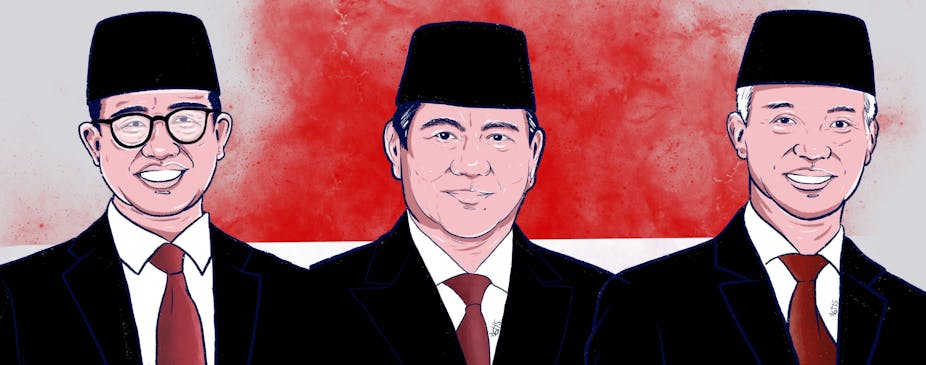Indonesians are heading to the polls on Wednesday February 14, to vote in the world’s biggest single-day election. After nearly three months of campaigning, the three pairs vying for presidential and vice presidential seats are now in the cooling-off period.
Now the world’s third largest democracy, Indonesia has experienced the past trauma of authoritarianism, up until the May 1998 protests and riots. That past is why the commitments of candidates to resolve human rights violations always come up during Indonesian elections.
Initiatives regarding human rights protection offered by the three candidates – Anies Baswedan, Prabowo Subianto and Ganjar Pranowo – have been highly debated between voters and their supporters.
The debates circulate about which candidates have offered better protection for human rights. However, it is essential to note that all three candidates have poor track records on human rights issues.
Anies: concerns about his backers
US-graduated professor in politics Anies Baswedan, along with his running mate Muhaimin Iskandar, appears to be the dark horse in the presidential race, as the pair’s electability in opinion polls has climbed to second place.

Their programs related to human rights underlines Anies’ pledges to strengthen national human rights institutions, resolve past human rights cases and provide socio-economic recovery for victims of human rights violations.
Anies is the candidate with the most comprehensive details on his plans to revise regulations hindering press freedom and civil liberties.
However, the track records of political parties in his coalition raise questions about their human rights commitments.
Nasdem Party and National Awakening Party (PKB), Anies’ two most prominent endorsers, voted to pass the controversial Criminal Code.
An Islamic party in his coalition, the Prosperous Justice Party (PKS), was the most vocal opponents of an anti-sexual violence bill, the long-awaited regulation criminalising rape, including marital rape, and provides protection and supports of victims of sexual violence.
Anies was associated with identity politics when he ran in the 2017 election for Jakarta Governor, which resulted in religion and race discrimination against minorities.
Prabowo: haunted by deadly human rights allegations
Frontrunner Prabowo Subianto, who is running with President Joko “Jokowi” Widodo’s eldest son Gibran Rakabuming Raka, has pledged to strengthen democracy by protecting human rights for citizens.

The pair have also promised to eliminate discriminatory practices, including protecting the fundamental rights of communities and vulnerable groups.
However, only Prabowo-Gibran have not included any program to resolve past human rights violations among all candidates.
Similar to the 2014 and 2019 elections, the presidential race this year is surrounded by the re-emergence of memories of the traumatic May 1998 riots. Prabowo was the commander of the Indonesian army’s special force and was strongly suspected of being involved in the abduction of pro-democracy activists in 1998. Prabowo also ran as a presidential candidate in the past two elections.
A number of former members of the force’s Mawar Team, an elite team that was alleged to have masterminded the kidnapping operation, are now in Prabowo’s campaign team.
Prabowo’s political party has a crucial role in supporting the passing of the country’s controversial new Criminal Code.
The law is deemed disastrous for civilians, as it forbids insulting the president, as well as banning extramarital and premarital sex and contraception.
Legal controversy also mars Prabowo-Gibran’s candidacy through the breaching of constitutional ethics. The country’s constitutional court ruling has been called as in favour to Gibran, President Jokowi’s son. The ruling led to a change in the minimum age requirement in the 2017 election law, which make way for his son to run in the race.
Ganjar: unresolved agrarian disputes
Candidate Ganjar Pranowo and his running mate, Mahfud MD, have pledged to guarantee civil liberties, including the freedom to express an opinion and disseminate information. However, they do not expressly state what kinds of programs they will have to achieve this.

Ganjar has a poor record on agrarian conflicts during his tenure as the former governor of Central Java.
In 2018, he issued an environmental permit to construct the Bener Dam in Purworejo, Central Java, as part of a mining site. This triggered massive rejections from residents, who then staged protests over concerns about environmental damage for years.
In February 2022, as many as 60 residents (including minors) of Wadas Village, one of the villages in Purworejo, were arrested by police for allegedly rejecting the measurement of the land to be used for the mining.
In 2016, Ganjar issued an environmental permit to build a cement factory in Rembang, Central Java. This sparked protests from farmers over concern for agricultural damages.
Both cases reflect his alleged favouritism to corporations, rather than guaranteeing the environmental rights of the citizens.
Another fact is that Ganjar is endorsed and a member of the Indonesian Democratic Party of Struggle (PDI-P), now the largest party in the country.
The party initiated the revision of the country’s anti-corruption law. The revision once sparked massive protests as it was deemed to weaken Indonesia’s corruption eradication body.
No candidate is clean
The three presidential and vice-presidential pairs and their supporters have yet to be entirely assertive on the issue of civil liberties and human rights protection.
Additionally, on the first Presidential debate held in December 2023, the candidates failed to provide substantive policies on human rights issues, left out specific steps that would be taken if they were elected.
Given their track records, Indonesian voters face a challenge to vote for the candidate with the clearest position on human rights issues, given no one is thoroughly “clean” from human rights controversies.


